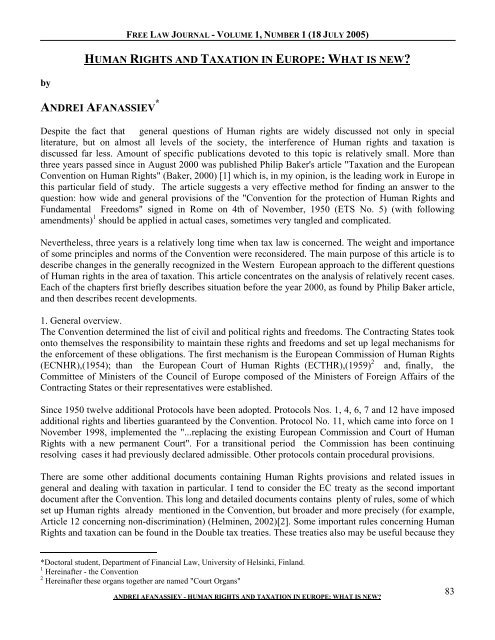Free_Law_Journal-Vol.. - Free World Publishing Inc.
Free_Law_Journal-Vol.. - Free World Publishing Inc.
Free_Law_Journal-Vol.. - Free World Publishing Inc.
Create successful ePaper yourself
Turn your PDF publications into a flip-book with our unique Google optimized e-Paper software.
FREE LAW JOURNAL - VOLUME 1, NUMBER 1 (18 JULY 2005)<br />
HUMAN RIGHTS AND TAXATION IN EUROPE: WHAT IS NEW?<br />
by<br />
ANDREI AFANASSIEV *<br />
Despite the fact that general questions of Human rights are widely discussed not only in special<br />
literature, but on almost all levels of the society, the interference of Human rights and taxation is<br />
discussed far less. Amount of specific publications devoted to this topic is relatively small. More than<br />
three years passed since in August 2000 was published Philip Baker's article "Taxation and the European<br />
Convention on Human Rights" (Baker, 2000) [1] which is, in my opinion, is the leading work in Europe in<br />
this particular field of study. The article suggests a very effective method for finding an answer to the<br />
question: how wide and general provisions of the "Convention for the protection of Human Rights and<br />
Fundamental <strong>Free</strong>doms" signed in Rome on 4th of November, 1950 (ETS No. 5) (with following<br />
amendments) 1 should be applied in actual cases, sometimes very tangled and complicated.<br />
Nevertheless, three years is a relatively long time when tax law is concerned. The weight and importance<br />
of some principles and norms of the Convention were reconsidered. The main purpose of this article is to<br />
describe changes in the generally recognized in the Western European approach to the different questions<br />
of Human rights in the area of taxation. This article concentrates on the analysis of relatively recent cases.<br />
Each of the chapters first briefly describes situation before the year 2000, as found by Philip Baker article,<br />
and then describes recent developments.<br />
1. General overview.<br />
The Convention determined the list of civil and political rights and freedoms. The Contracting States took<br />
onto themselves the responsibility to maintain these rights and freedoms and set up legal mechanisms for<br />
the enforcement of these obligations. The first mechanism is the European Commission of Human Rights<br />
(ECNHR),(1954); than the European Court of Human Rights (ECTHR),(1959) 2 and, finally, the<br />
Committee of Ministers of the Council of Europe composed of the Ministers of Foreign Affairs of the<br />
Contracting States or their representatives were established.<br />
Since 1950 twelve additional Protocols have been adopted. Protocols Nos. 1, 4, 6, 7 and 12 have imposed<br />
additional rights and liberties guaranteed by the Convention. Protocol No. 11, which came into force on 1<br />
November 1998, implemented the "...replacing the existing European Commission and Court of Human<br />
Rights with a new permanent Court". For a transitional period the Commission has been continuing<br />
resolving cases it had previously declared admissible. Other protocols contain procedural provisions.<br />
There are some other additional documents containing Human Rights provisions and related issues in<br />
general and dealing with taxation in particular. I tend to consider the EC treaty as the second important<br />
document after the Convention. This long and detailed documents contains plenty of rules, some of which<br />
set up Human rights already mentioned in the Convention, but broader and more precisely (for example,<br />
Article 12 concerning non-discrimination) (Helminen, 2002)[2]. Some important rules concerning Human<br />
Rights and taxation can be found in the Double tax treaties. These treaties also may be useful because they<br />
*Doctoral student, Department of Financial <strong>Law</strong>, University of Helsinki, Finland.<br />
1 Hereinafter - the Convention<br />
2 Hereinafter these organs together are named "Court Organs"<br />
ANDREI AFANASSIEV - HUMAN RIGHTS AND TAXATION IN EUROPE: WHAT IS NEW?<br />
83
















